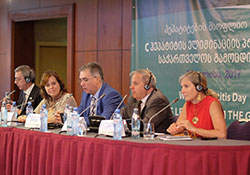Georgia’s hepatitis C elimination programme setting an example in Europe

NCDC Georgia
In Georgia, about 150 000 people (or 1 in 20), were affected by hepatitis C in 2015. That same year, the country became the first in the WHO European Region to set the goal of eliminating hepatitis C as a public health threat. Two years later, 32 000 people have been successfully cured. On World Hepatitis Day 2017, on 28 July, national and international experts met in Tbilisi with representatives of WHO/Europe to assess progress and challenges of the Georgia hepatitis C elimination programme.
Opening the meeting, Dr Nedret Emiroglu, Director of the Division of Health Emergencies and Communicable Diseases, WHO/Europe, commended Georgia for its ambitious elimination goal. She continued: “Georgia’s hepatitis C elimination programme is an example of an effective public–private partnership that secures access to services to all, particularly the vulnerable ones, in the spirit of universal health coverage”.
An exemplary journey
Georgia set its hepatitis C elimination goal in 2015 with the support of WHO, the United States Centers for Disease Control and Prevention and other partners, and signed a memorandum of understanding with a pharmaceutical manufacturer with the objective of providing new highly effective treatment for hepatitis C.
A year later, a long-term strategy for 2016–2020 was adopted to eliminate the disease from the country. This strategy has driven improvements in monitoring and surveillance, infection control and prevention; it has also expanded access to hepatitis C screening, diagnosis and treatment services.
Since the launch of the programme, almost 40 000 patients have started treatment with new antiviral medicines, out of which almost 32 000 have already completed the treatment successfully. Large-scale activities are taking place to ensure at-risk groups are screened, including key populations, medical personnel and all hospitalized people.
World Hepatitis Day 2017 in Georgia
The meeting to mark World Hepatitis Day 2017 in Georgia was opened by Dr David Sergeenko, Georgia’s Minister of Labour, Health and Social Affairs; Mr Ian C Kelly, United States’ Ambassador to Georgia; Mr Charles Gore, President of the World Hepatitis Alliance; and WHO/Europe’s Dr Nedret Emiroglu. Representatives of Armenia, Azerbaijan, Kyrgyzstan, Republic of Moldova, Ukraine and Uzbekistan participated along with Georgian representatives.
Following the review of progress of the Georgia hepatitis C elimination programme, experts in a roundtable discussion advocated for the programme’s integration into the overall health system as it would benefit other health problems such as HIV and tuberculosis. The discussion progressed beyond the health sector, as the programme could also help reduce stigma and inequalities.
As part of the event, a study tour was organized by the National Centre for Disease Control and Public Health of Georgia (NCDC) that took participants to visit the major hepatitis C screening facilities, treatment centres and the viral hepatitis reference laboratory of the NCDC Lugar Center.



